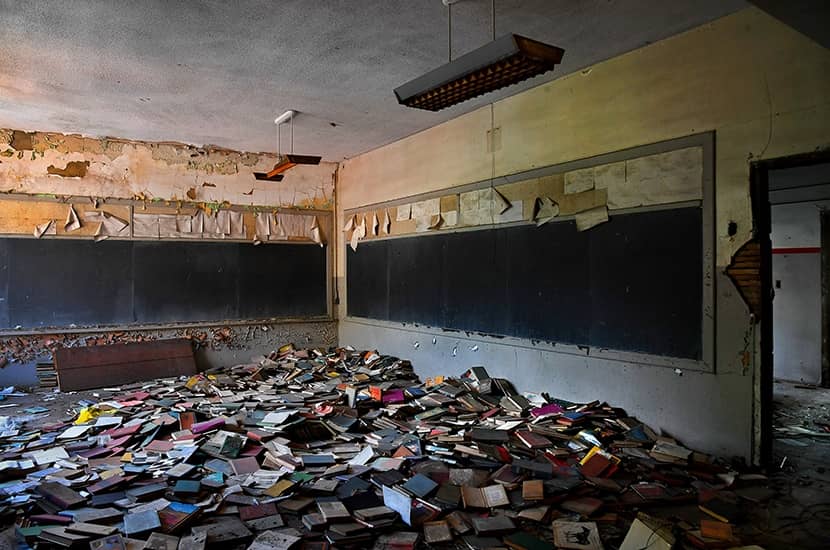After leaving college more than two decades ago, Evan Osnos landed a job on the Exponent Telegram, one of two daily papers published for the 16,400 citizens living in the West Virginia town of Clarksburg. Like many local reporters in those far-off days before the internet, he covered pretty much everything in his community, from boxing bouts and house fires to local politics and miners’ strikes. Later, working abroad in China and the Middle East, he would often check the paper’s website to keep up with events, observing from afar the drastic decline of both his own industry and the Appalachian state.
West Virginia was a Democratic stronghold when Osnos was driving around its farms, mines and schools. But factories shut in the face of foreign competition, papers closed as advertising moved online, residents left faster than in any other state and problems such as obesity and opioid addiction mounted. A growing focus on climate change worried many coal miners. The Republican strategist Karl Rove saw the state’s vulnerability, winning it for George W. Bush in 2000 as the culture wars turned rural parts of the United States red. This was the first time it had backed the party in a presidential vote for 72 years — yet by the time Donald Trump came along 16 years later, it gave him the strongest support of any state.
Factories shut, newspapers closed and residents left West Virginia faster than any other state
Wildland is the latest attempt to analyse the fissures and fury in the US exposed so starkly by Trump’s election. Osnos, a writer on the New Yorker, grapples with America’s anger by focusing on three places of significance in his own life. He uses Clarksburg to examine industrial change, predatory finance and the exploitation of the natural resources beneath the feet of poor communities; his prosperous hometown of Greenwich, Connecticut, to dissect ‘a gospel of economic liberty’ that has turbo-charged capitalism while inflaming inequality; and his ancestral home of Chicago, to probe the cruel history of segregation and racism that torments the nation.
This smart journalistic device works best in his portrait of Greenwich, where he grew up in a ‘golden triangle’ representing the highest concentration of wealth in the country. It was filled with corporate chiefs so discreet with their cash they could not be told apart from teachers; but then flashy Wall Street deal-makers took over, as the town became home to one tenth of worldwide hedge funds. By 2004 one fund manager pocketed more than a billion dollars in a year, calling his huge boat Fountainhead, after the Ayn Rand novel about rampant individualism. Newcomers cut themselves off behind higher walls — ‘products of one of the most extraordinary accumulations of wealth in American history’ — and office rents soared to double Manhattan rates.
Osnos uses this transformation to symbolise the corrosion of the American dream, as inequality widened, corporate greed intensified, profits ended up in the pockets of top executives and banks spent less on efforts to create new jobs. So many neighbours on Round Hill Road became snared in financial scandal it was nicknamed Rogues Hill Road.
This slide in values was mirrored in politics, as the town shifted from the noblesse oblige conservatism of grandees such as Prescott Bush — the father and grand-father of Republican presidents as well as eight times champion at the local golf club — into the embrace of Trump. Country club Republicans may not match the clichéd image of Trump fans, but as the author points out, in the 2016 election the tycoon’s voters had far higher average incomes than those backing Hillary Clinton.
Osnos is a skilled reporter who uses intriguing characters such as the doctor- turned-fund-manager Chip Skowron, jailed for insider dealing, to paint his picture of a country that ‘spun so far out of balance that it had lost its centre of gravity’. He marshals powerful statistics to support his case for a crumbling society, such as Connecticut having the richest 1 per cent but among the worst roads of any state, or Chicago police shooting 400 people in seven years, but all ruled ‘justified’. The parts on West Virginia also work well as a device to examine the damaging impact of libertarian politics — backed by self-interested billionaires — and lobbyists funded by the coal industry to thwart policies to protect the environment, showing the catastrophic consequences as mountain tops are blown off and water systems contaminated.
Less satisfactory are the chunks on Chicago. These feel slightly perfunctory, despite valiant efforts to draw parallels between black residents and white Appalachians as people trapped by history and failed by their economy, institutions and political elite. Ultimately this book reads too much like a series of New Yorker articles stitched together, with a few unwieldly detours before descending into boilerplate analysis of Trump. There is much to admire in Wildland but it would have been better to dial down the predictable take on his populism and delve even deeper into three very different parts of the country to understand the dislocating anger that has erupted in America.






Comments